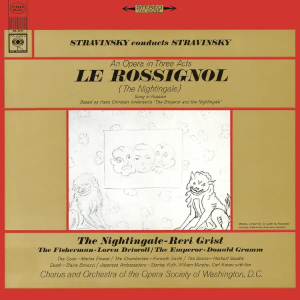
Igor Stravinsky (1882-1971)
Le Rossignol (1908-9, 1913-4)
Loren Driscol (tenor), The Fisherman
Reri Grist (soprano), The Nightingale
Marina Picassi (soprano), The Cook
Kenneth Smith (bass), The Chamberlain
Herbert Beattie (bass), The Bonze
Donald Gramm (baritone), The Emperor
Elaine Bonazzi (contralto), Death
Chorus and Orchestra of the Opera Society of Washington D.C./Igor Stravinsky
rec. 1960, Washington D.C.
Texts and translations not included
Reviewed as a 44.1 khz/16 kbps lossless download
Sony Classical G010003470229K [44]
Stravinsky’s first opera has always been known by the French translation of its name, Le Rossignol rather than its original Russian name of Solovey. The work is a picture postcard of Chinoiserie in a musical setting. I fell in love with the piece when I first encountered at the age of 16 it on a radio broadcast from the Metropolitan Opera and it remains something of a guilty pleasure to this day. While Stravinsky’s miniature doesn’t reach into any major emotional depths, there is a simple effectiveness about the piece which can be touching when the nightingale’s singing chases away the spirit of death.
Igor Stravinky’s own recording of the work, while flawed, is still one of the more recommendable stereo versions of the piece. It has been populated with a cast of young American singers who were pretty much unknown at the time. Of all of them, only Reri Grist and Donald Gramm would go on to have especially noteworthy careers in the US and abroad.
Loren Driscol’s Fisherman demonstrates a very clean tenor sound and an earnest approach to the role which is pleasant. This particular role has not fared all that well on recordings, as most of Driscol’s competitors lack sweetness and distinctive shaping of the Fisherman’s flowing lines. Jean Giraudeau, on the old mono Cluytens recording, surpasses everyone (including Driscol) with his elegant phrasing and his ability to project the dreamy, poetic nature of the Fisherman.
Reri Grist is a Nightingale par excellence. Her voice is bright and clear although at this early stage in her career she had not developed the finely honed edge to her tone that made her voice so instantly recognizable. She sings the Nightingale’s lines with grace and purity of line.
Donald Gramm is somewhat miscast as the Emperor. His baritone sounds a bit throaty on this recording which doesn’t adequately convey a sense of the stature of the Imperial Ruler. Both Kenneth Smith and Marina Picassi perform ably as the Chamberlain and the Cook. There is a true vocal success found in the Bonze of the massive-voiced Herbert Beattie. His repeated “Tzing-Boom’s “seem to originate from down in his boots. Similarly Elaine Bonazzi is a pungent sounding Death; one sits up and takes notice of her unusual vocal timbre.
Stravinsky conducts a leisurely reading of his own score with clarity if not with purpose. He often seems to revel in his own orchestration. The stereo sound is extremely good despite its age. The engineers have gone in for an analytical sound in which everything is quite immediate and under the studio spotlight to which echo chamber reverb has been added, at times glaringly so. To my ears this is the most recommendable of the stereo versions of this little opera. I have found that both the Boulez and Conlon versions have individual problems in their casts which put them out of consideration. Stravinsky’s Sony recording is certainly not perfect by any means. The strongly American accented Russian will probably make it tortuous for anyone who is familiar with the Russian language to accept, but on the balance it comes out ahead of any of its more recent competitors. Alternatively, If one is willing to put up with Le Rossignol sung in French translation and an old mono recording, then André Cluytens version is still the finest of them all and has been reissued on CD by Testament.
Mike Parr
Help us financially by purchasing from

Other Cast
Stanley Kolk (1st Japanese Ambassador)
William Murphy (2nd Japanese Ambassador
Carl Kaiser (3rd Japanese Ambassador)

















